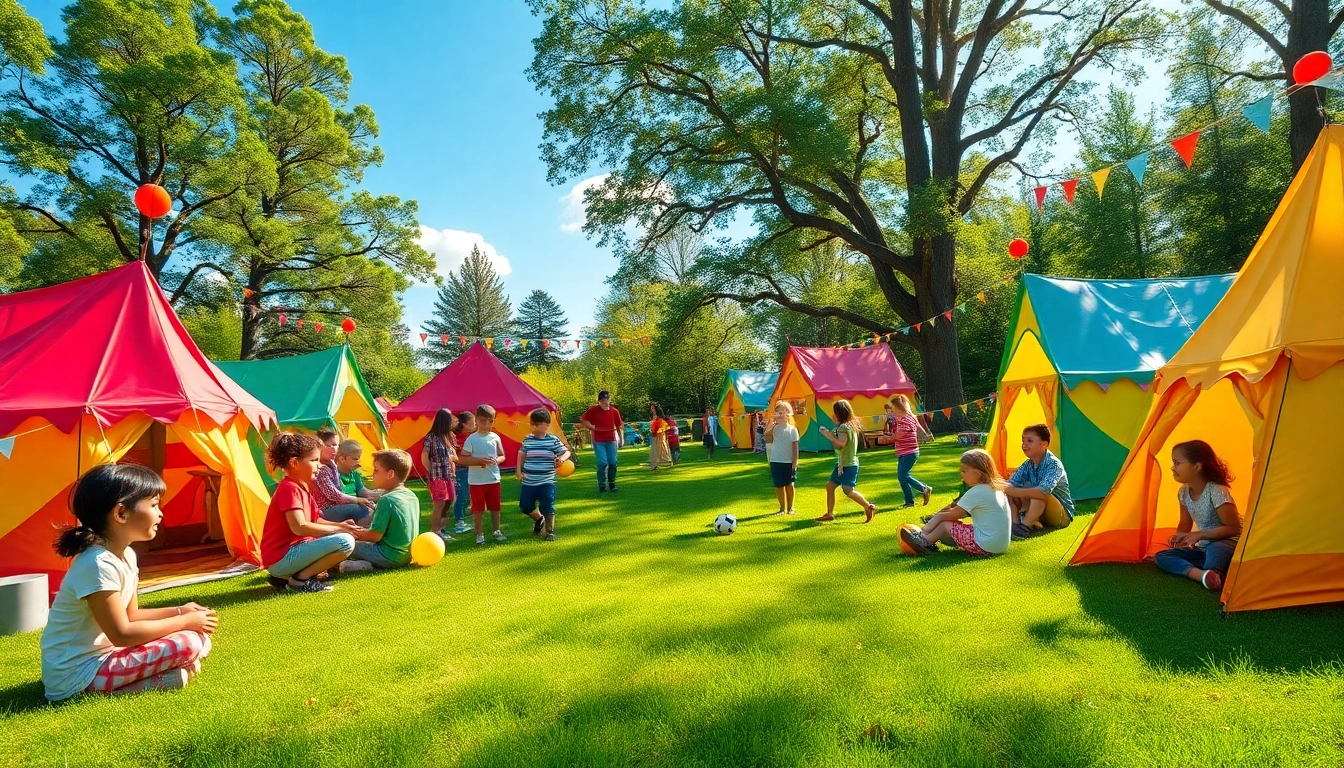What Are Holiday Camps?
Holiday camps are structured accommodation facilities that provide a range of recreational activities and services, catering primarily to families and children. These camps offer programs that foster social interaction, skill development, and physical activity, making them an attractive option for parents seeking engaging and safe experiences for their children. Particularly popular in the UK, holiday camps are designed to keep holidaymakers entertained with various on-site activities.
Definition and History
The concept of holiday camps emerged in the early 20th century, aiming to provide a blend of leisure and community for families wanting to escape urban life. Initially, these camps were found in seaside resorts, but as demand grew, they expanded to include rural areas and forested regions. The term “holiday camp” describes accommodations that typically encompass recreational facilities, organized activities, and meals — all designed to create an engaging environment for guests.
Notably, the UK holiday camp model includes not just amenities like swimming pools and sports facilities but also entertainment such as live shows and themed events. Over decades, firms such as Butlins and Pontins became synonymous with this form of leisure, establishing holiday camps as a staple of British family holidays.
Types of Holiday Camps Available
Holiday camps come in various formats, each catering to different needs and preferences:
- Family-Oriented Camps: Designed for families, these camps focus on group activities and family bonding experiences, offering kids’ clubs, family games, and excursions.
- Sports Camps: These camps emphasize physical activities, offering specialized training in various sports ranging from soccer to swimming and cycling, often led by professional coaches.
- Arts and Crafts Camps: Catering to the creative minds, these camps focus on artistic expression through various workshops involving painting, pottery, music, and drama.
- Adventure Camps: Ideal for thrill-seekers, these camps may offer activities like rock climbing, zip-lining, and wilderness survival courses.
- Educational Camps: These programs focus on learning experiences and may include science camps, cooking camps, and sometimes incorporate learning about the environment and sustainability.
Benefits of Attending Holiday Camps
Choosing to enroll children in holiday camps presents multiple benefits:
- Social Skills Development: Camps offer the opportunity for children to meet peers, fostering friendships and improving social skills through group activities.
- Physical Activity: With a wealth of outdoor activities, holiday camps encourage children to be physically active, which is crucial for their overall health and well-being.
- Skill Development: Children can learn new skills, whether through sports, arts, or other camp specialties, enhancing their confidence and competence.
- Independence: For many children, holiday camps represent their first time away from home, which helps in building independence and resilience.
- Fun and Engagement: The variety of activities offered ensures that children are thoroughly entertained, reducing stress and increasing happiness.
Choosing the Right Holiday Camp
Deciding on a holiday camp requires careful consideration to ensure it aligns with both the needs of the child and the expectations of the parents. Knowing what to look for can make a significant difference in the camp experience.
Factors to Consider When Selecting a Camp
When selecting a holiday camp, consider the following:
- Age Appropriateness: Ensure that the camp’s programs are suitable for your child’s age group, as activities vary widely across different camps.
- Location: Proximity to home may be important for ease of transport, although some families may opt for camps further away, particularly for more specialized programs.
- Facilities and Amenities: Look into what facilities are available, such as swimming pools, sports fields, and arts and crafts areas. Quality facilities can greatly enhance the camp experience.
- Staff Qualifications: It’s crucial that staff are experienced and properly trained, particularly in areas concerning health and safety. Check for qualifications and background checks.
- Parent Reviews and Reputation: Researching reviews and testimonials from other parents can provide insight into the camp’s reputation and the experiences of previous attendees.
Popular Holiday Camps in the UK
The UK boasts several well-known holiday camps that have established a solid reputation for quality and service. Some of these include:
- Butlins: A classic name among holiday camps, Butlins offers varied activities, entertainment, and accommodations across multiple locations in the UK.
- Pontins: A longstanding competitor of Butlins, Pontins provides affordable holiday experiences with numerous activities suitable for families.
- Center Parcs: While not a traditional camp, Center Parcs provides a resort-based experience with outdoor activities and family entertainment focused on nature.
- Parkdean Resorts: These parks provide bustling holiday environments with lots of leisure options, suitable for families wanting a lively camp atmosphere.
Camp Reputation and Reviews
When considering a holiday camp, don’t underestimate the importance of reputation. Checking online reviews, forums, and social media can provide valuable insight into what you can expect. Websites like TripAdvisor, Google Reviews, and parenting blogs are excellent resources for authentic parent feedback. Look for patterns across reviews concerning staff interactions, safety protocols, and the overall enjoyment of existing campers.
Activities Typically Offered at Holiday Camps
Activities are the heart of the holiday camp experience, influencing both enjoyment and engagement levels. Here’s a deeper look at the variety of offerings generally found at holiday camps.
Outdoor Adventures and Team Sports
Many camps put a heavy emphasis on outdoor activities that promote teamwork and physical fitness. Common outdoor options include:
- Sports: Various team sports such as soccer, basketball, and volleyball are popular, encouraging cooperation and sportsmanship.
- Adventure Activities: This includes activities such as hiking, trail biking, and even rock climbing. These experiences promote physical fitness and risk management.
- Water Sports: For camps near lakes or the coast, water sports like kayaking, paddleboarding, and swimming are frequently offered, enhancing fun and skill in water activities.
Creative Workshops and Arts
Camps increasingly recognize the importance of creativity, incorporating a variety of arts programs:
- Visual Arts: Painting, drawing, and crafts sessions allow children to express themselves creatively while honing their skills.
- Performing Arts: These may include drama, dance, and music, encouraging children to explore their artistic talents in a supportive environment.
- Workshops: From photography to film-making or even creative writing, workshops can engage children in new pursuits they may discover a passion for.
Educational Programs and Learning Experiences
Some camps also offer a range of educational experiences, catering to curious minds eager to learn:
- Nature Programs: Learning about the environment and conservation can be integrated into camp activities, fostering a sense of respect for nature.
- Science Workshops: Camps may offer scientific exploration, such as simple experiments, computer coding, and even robotics, enhancing learning through hands-on experience.
- Culinary Classes: Cooking and nutrition sessions can introduce children to healthy eating practices while allowing them to explore their culinary skills.
How to Prepare for Holiday Camps
Successful camp experiences often hinge on adequate preparation. Here are key steps to ensure a smooth transition into camp life.
Packing Essentials for Your Camp Experience
Proper packing can set the tone for a successful camping experience. Essentials might include:
- Clothing: Pack appropriate clothing for various activities and weather conditions, including active and evening wear. Remember swimwear and sturdy shoes.
- Personal Items: Include toiletries, sunscreen, a refillable water bottle, and any necessary medications or personal items.
- Comfort Items: A favorite blanket or stuffed animal can ease homesickness and provide comfort during overnight stays.
Understanding Camp Policies and Regulations
Every camp has its set of rules and policies regarding behavior, safety, and other operational aspects. Familiarize yourself and your child with these regulations to ensure compliance and make the experience as enjoyable as possible. Parents should inquire about:
- Drop-off and pick-up procedures
- Emergency protocols
- Health and safety measures, particularly concerning allergies or medical conditions
Tips for a Successful Transition to Camp
Transitioning to camp can be challenging for children, especially for first-timers. Here are strategies to help ease the adjustment:
- Talk About Expectations: Discuss what camp life will be like, including activities, making new friends, and the daily schedule.
- Plan a Visit: If possible, take a tour of the camp beforehand. Familiarity can help reduce anxiety.
- Encourage Independence: Allow children to take ownership of packing and selecting personal items to bring to camp. This can promote excitement and ownership over their experience.
The Impact of Holiday Camps on Children
Beyond fun and recreation, holiday camps profoundly impact children’s development. Here are some of those long-term benefits:
Social Development and Teamwork
Participating in group activities helps children build social skills, learn to work as part of a team, and navigate interpersonal interactions. Camps facilitate networks of friendships that can last long after the holiday season, strengthening mutual respect and camaraderie among peers. Learning to solve problems together fosters a sense of collaboration and shared successes, crucial skills applicable beyond the camp environment.
Building Independence and Confidence
Many children face new challenges while at camp, which encourages them to step outside their comfort zones. Successfully completing new tasks and activities fosters independence and self-reliance, significantly boosting their confidence. Triumphing over fears—such as swimming alone or making new friends—perpetuates a sense of accomplishment that carries into their everyday lives.
Positive Memories and Lifelong Friendships
The experiences children have during holiday camps create cherished memories that can last a lifetime. Stories shared, challenges faced together, and friendships forged can create a robust communal bond among participants. These memories often become a central part of their childhood narratives, contributing to positive emotional development and nostalgia for years to come.



